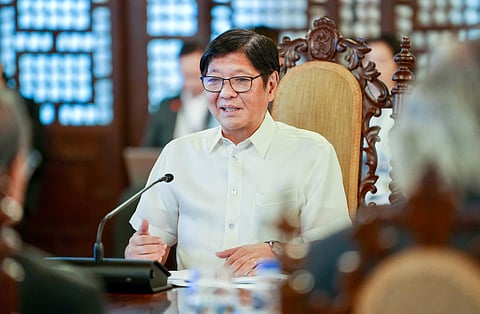
- NEWS
- the EDIT
- COMMENTARY
- BUSINESS
- LIFE
- SHOW
- ACTION
- GLOBAL GOALS
- SNAPS
- DYARYO TIRADA
- MORE

Senator Imee Marcos on Thursday criticized the National Economic and Development Authority’s (NEDA) plan to slash tariffs on imported rice, calling it a “death wish” for local farmers.
“I hope the recommendation of NEDA to set a 15 percent tariff is reconsidered because it seems like we are encouraging the farmers to commit suicide,” Marcos told reporters in an interview.
NEDA announced on Tuesday its plan to cut the tariff on rice imports from 35 percent to 15 percent in an effort to stabilize the price of the staple grain. President Ferdinand Marcos Jr. chairs the NEDA board.
“It is not a simple solution. It’s a ham-fisted response to inflation. I don’t think it works quite that way,” said Marcos, vice-chair of the Senate Committee on Agriculture.
She also questioned the logic behind the proposal to reduce rice tariffs until 2028.
“As far as I know, it’s usually for a period of six months to one year because it’s a mere emergency measure. What kind of emergency measure is this, until 2028?” she asked.
“It’s like you’ve buried the local farmers for four and a half years. There’s no hope for that. It is like we’ve given up on them. What is that? Is it right for it to last five years?” she added.
NEDA chief Arsenio Balisacan said the decision to reduce rice tariffs “is expected to bring down rice prices for consumers while supporting domestic production through tariff cover and increased budgetary support to improve agricultural productivity, especially as global rice prices remain elevated.”
Meanwhile, the House Committee on Agriculture and Food has pledged that the reduced duties on imported rice would not negatively affect government support for rice farmers despite a substantial increase in funding to enhance farmers’ competitiveness under the proposed amendments to the Rice Tariffication Law (RTL).
“Even at the higher allocation of P15 billion for the Rice Competitiveness Enhancement Fund under the House version of the revised RTL, we are already assured it will be funded for next year,” said Quezon Rep. Mark Enverga, panel chairman.
The current RCEF, or the Rice Fund, sets aside P10 billion a year from tariff collection on rice imports to fund farm mechanization, provision of better seeds, and training on new farming technologies.
The RCEF was supposed to end this year, but pending legislation seeks to extend the Rice Fund until 2030.
Data from the Bureau of Customs showed that tariff collection on rice imports in the first five months of 2024 already reached P21 billion, more than enough to cover the proposed higher Rice Fund allocation.
“We will make sure that our rice farmers won’t be short-changed in this government effort to bring down the cost of rice for the benefit of millions of Filipino consumers. So, even if tariff collection falls short for RCEF allocation, the government will provide funds to fill whatever deficiency to ensure sufficient financing for the Rice Fund,” Enverga said.
Enverga joined Speaker Martin Romualdez in meeting with representatives of government agencies and large supermarket operators to ensure that the expected benefits of the impending tariff reduction to 15 percent from 35 percent will trickle down to consumers in the form of lower-priced food staples.
The tariff reduction is expected to be implemented within the third quarter.
“This is now a whole-of-nation approach. The private supermarket operators, who we met earlier, are willing to absorb some losses in support of this effort of President Ferdinand Marcos Jr. to bring down the price of rice,” Romualdez said.
“What we want is that every Filipino family table will have affordable, quality rice all year round,” he added.
The House chief forecasted that the country would feel the impact of the tariff reduction before the third State of the Nation Address of President Ferdinand Marcos next month.
Agriculture Undersecretary Christopher Morales, head of the Department of Agriculture’s Masagana Rice Industry Development Program, said the agency will ensure that all the support needed by rice farmers will be provided, and if required, additional funds will be sought from Congress.
